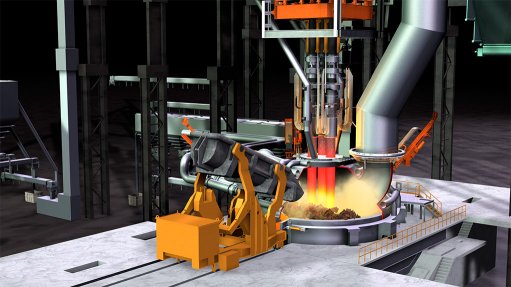
INJECTOR TECHNOLOGY Increases the amount of primary energy needed for the melting process, which significantly reduces a steel producer’s grid-based energy consumption
The rising conversion cost of steel production, coupled with low steel consumption and oversupply, has prompted steel producers worldwide to implement technological and operational modifications to improve plant efficiencies and reduce operating costs, says the South African arm of Germany-based metallurgical plant and rolling mill technology provider SMS Siemag.
Company director Klaus Schmale points out that the low level of steel consumption has been persisting since 2012 and a latent overcapacity in the market worldwide can be expected in the next few years.
To mitigate this challenge, SMS Siemag has shifted its focus to smaller projects and started improving existing plants and the equipment that customers use, he adds.
“Steel producers do not have the capital to spend on new plants and, as such, SMS Siemag is trying to improve its clients’ plant availability and reduce their operational costs by analysing operational data such as energy consumption and equipment availability. This is our current focus and I believe this will remain the company’s focus in the foreseeable future,” Schmale comments.
He points out that, because large capital expenditure projects, such as the construction of new steel mills, are not feasible in the current constrained market, steel producers are increasingly focusing on the maintenance of existing plants, offering SMS Siemag additional market opportunities in this field by improving the overall effectiveness of equipment.
“Maintenance is a significant focus for us, with many of our customers contracting us to handle their plant service and maintenance tasks to further reduce operational costs,” Schmale asserts, adding that this is not a new endeavour for SMS Siemag, which has been providing these services for eight years to countries worldwide.
He adds that while South African steel producers have historically handled their own maintenance, local steel producers are now approaching SMS Siemag South Africa to provide these services.
“Local producers are aiming to compete globally and they therefore need to reduce their cost base and produce steel more efficiently. This can be done by making minor adjustments, such as reducing electricity consumption by employing more efficient processes or substituting grid-based power with alternative energy sources.”
Schmale points out that SMS Siemag can apply injector technology to furnaces to increase the amount of primary energy needed for the melting process, which significantly reduces a steel producer’s grid-based energy consumption.
He adds that gas-powered burner technology developed for European melters, which preheats charge material, including scrap metal or crude steel, offers additional energy savings. This is because the charge material is melted before undergoing further treatment in electrical arc furnaces.
“These are existing technologies that do not require substantial capital expenditure,” says Schmale.
He concludes that, while these technologies require a considerable amount of space, they could nevertheless reduce South African steel producers’ operating expenses, enabling them to be more competitive globally.